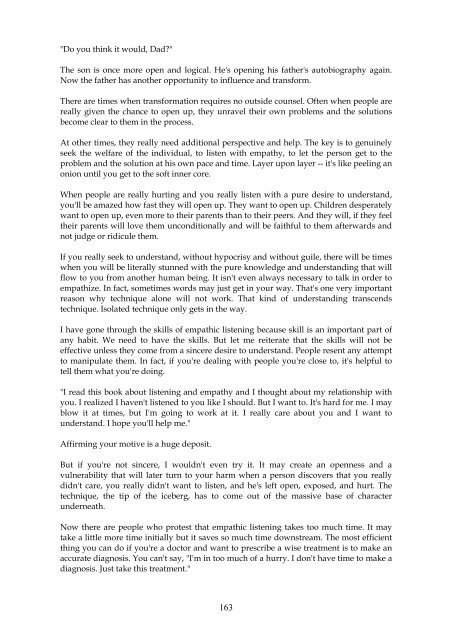Covey - The 7 habits of highly effective people
Create successful ePaper yourself
Turn your PDF publications into a flip-book with our unique Google optimized e-Paper software.
"Do you think it would, Dad?"<br />
<strong>The</strong> son is once more open and logical. He's opening his father's autobiography again.<br />
Now the father has another opportunity to influence and transform.<br />
<strong>The</strong>re are times when transformation requires no outside counsel. Often when <strong>people</strong> are<br />
really given the chance to open up, they unravel their own problems and the solutions<br />
become clear to them in the process.<br />
At other times, they really need additional perspective and help. <strong>The</strong> key is to genuinely<br />
seek the welfare <strong>of</strong> the individual, to listen with empathy, to let the person get to the<br />
problem and the solution at his own pace and time. Layer upon layer -- it's like peeling an<br />
onion until you get to the s<strong>of</strong>t inner core.<br />
When <strong>people</strong> are really hurting and you really listen with a pure desire to understand,<br />
you'll be amazed how fast they will open up. <strong>The</strong>y want to open up. Children desperately<br />
want to open up, even more to their parents than to their peers. And they will, if they feel<br />
their parents will love them unconditionally and will be faithful to them afterwards and<br />
not judge or ridicule them.<br />
If you really seek to understand, without hypocrisy and without guile, there will be times<br />
when you will be literally stunned with the pure knowledge and understanding that will<br />
flow to you from another human being. It isn't even always necessary to talk in order to<br />
empathize. In fact, sometimes words may just get in your way. That's one very important<br />
reason why technique alone will not work. That kind <strong>of</strong> understanding transcends<br />
technique. Isolated technique only gets in the way.<br />
I have gone through the skills <strong>of</strong> empathic listening because skill is an important part <strong>of</strong><br />
any habit. We need to have the skills. But let me reiterate that the skills will not be<br />
<strong>effective</strong> unless they come from a sincere desire to understand. People resent any attempt<br />
to manipulate them. In fact, if you're dealing with <strong>people</strong> you're close to, it's helpful to<br />
tell them what you're doing.<br />
"I read this book about listening and empathy and I thought about my relationship with<br />
you. I realized I haven't listened to you like I should. But I want to. It's hard for me. I may<br />
blow it at times, but I'm going to work at it. I really care about you and I want to<br />
understand. I hope you'll help me."<br />
Affirming your motive is a huge deposit.<br />
But if you're not sincere, I wouldn't even try it. It may create an openness and a<br />
vulnerability that will later turn to your harm when a person discovers that you really<br />
didn't care, you really didn't want to listen, and he's left open, exposed, and hurt. <strong>The</strong><br />
technique, the tip <strong>of</strong> the iceberg, has to come out <strong>of</strong> the massive base <strong>of</strong> character<br />
underneath.<br />
Now there are <strong>people</strong> who protest that empathic listening takes too much time. It may<br />
take a little more time initially but it saves so much time downstream. <strong>The</strong> most efficient<br />
thing you can do if you're a doctor and want to prescribe a wise treatment is to make an<br />
accurate diagnosis. You can't say, "I'm in too much <strong>of</strong> a hurry. I don't have time to make a<br />
diagnosis. Just take this treatment."<br />
163


